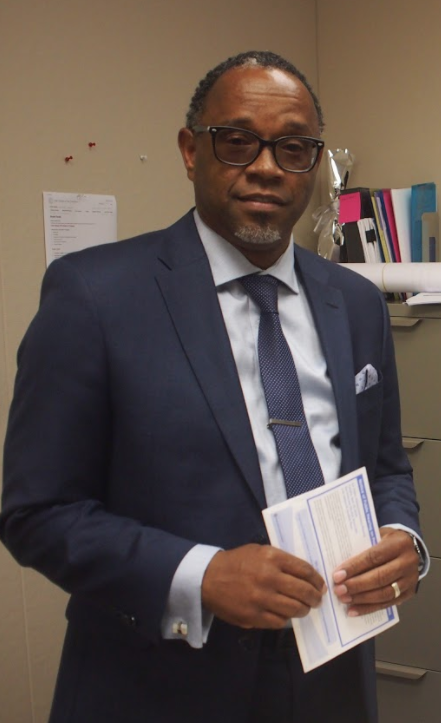New facilities head faces daunting challenge with aging campus
NEWS PROFILE
By Victor Tence
victortence@gmail.com
It’s not every day you start your new job with a backlog of 4,000 trouble tickets, stepping into a role where your predecessor was missing-in-action for months. But that’s exactly what Rueben Smith did in January when he joined City College to take on the daunting job of interim vice chancellor for facilities, planning, and construction.
Students and faculty at City College have grappled for years with facilities issues that range from broken water pipes, elevator maintenance, and faulty heating. With the size of Ocean Campus, eight centers and a handful of administrative and instructional sites to manage, simply assessing the magnitude of the repairs alone is a herculean task.
However, Smith steps into the role with over 15 years of experience. He has led similar programs in the Pasadena Community College District and managed a sustainable bond program in the Los Angeles Community College District—which has now grown to $9.3 billion, making it the largest redevelopment bond of its type.
In Smith’s field of work, size does matter.
The inherited issue of accumulated deferred maintenance alone now sits at a staggering $453 million across all campuses and a backlog of 4,000 work order requests, some dating back three years.
“Not only are we looking at just deferred maintenance but the impact of the total cost of ownership. It is really weighing down on this district,” Smith said.
Smith estimates the assessment period will extend to the end of this year, taking up half of his two-year contract with City College. Despite this, Smith has already made headway by presenting an unprecedented accounting of the campus facilities and projects at the board of trustees meeting on Jan. 25.
“You have in your hands something that did not exist, to my knowledge, until Dr. Smith showed up a couple weeks ago: a comprehensive accounting of every single facilities project in the college,” Chancellor Mark Rocha said at the meeting.
Notable in the report are buildings that have been marked as more expensive to repair than to fully tear down and rebuild. A sign, Smith said, that most of the problems we’re facing are rooted in the age of the campus.
“When you have buildings and grounds of this vintage, at some point it exhausts its life of usefulness. For example, bungalows. Most of the bungalows have exhausted their life. It’s actually cheaper to replace all of the bungalows than to do all the recommended repairs,” Smith said.
Smith pointed out that no building which falls under this category is considered unsafe, with the exception of the now vacated Eddy Street Campus—built in 1910—which requires a seismic upgrade.
City College, however, will not be demolition facilities anytime soon, despite the fact that we have reached a point where the maintenance team cannot outpace the growing number of problems.
Smith illustrated this point using the analogy of a car engine. “We keep changing the oil, but we keep waiting for things to fail because we don’t have the funding to do the capital improvement on the level that we need,” he said.
The lack of funding that forced City College to defer maintenance year after year now prevents any major overhaul to the aging campus.
In response, Smith has identified the roofing; the broken elevators; and the campus heating, ventilation and air conditioning systems as three key priorities. He believes addressing these issues is realistic in his two-year contract and will utilize his limited resources to make the greatest positive impact on the college.
“Funding is always going to be a challenge, but there are some things we have to commit to,” Smith said.
Along with repairing the campus, Smith must also rebuild the facilities department itself. Currently, he is looking to fill 12 open positions, ranging from project managers to electricians, to custodians and engineers. He hopes to have at least eight of those roles filled by June 30.
The position of buildings and grounds director remains notably vacant with no plans to hire anytime soon.
Smith is also rebuilding metaphorical bridges with the college community at large. He noted that the months his position remained vacant created a communication barrier for his department.
“People are knowledgeable and understand the challenge of facilities, although impatient sometimes because they’ve been identifying issues that haven’t been addressed and no one has communicated with them that we are going to follow up. Those are things that my department needs to do better,” Smith said.
In the past month, the facilities department website has been updated to provide feedback, and Smith personally wrote the campus-wide email about the recent cafeteria boiler failure. He particularly wants to be more proactive at communicating updates on campus issues that “appear to have no movement.”
Asked if he would like to remain in his new role once his two-year contract is completed, Smith said, “I would be lying to say I didn’t want to stay here, but right now the goal here is to facilitate the best possible teaching environment… And right now we are nowhere close; I’m just one day at a time.”

